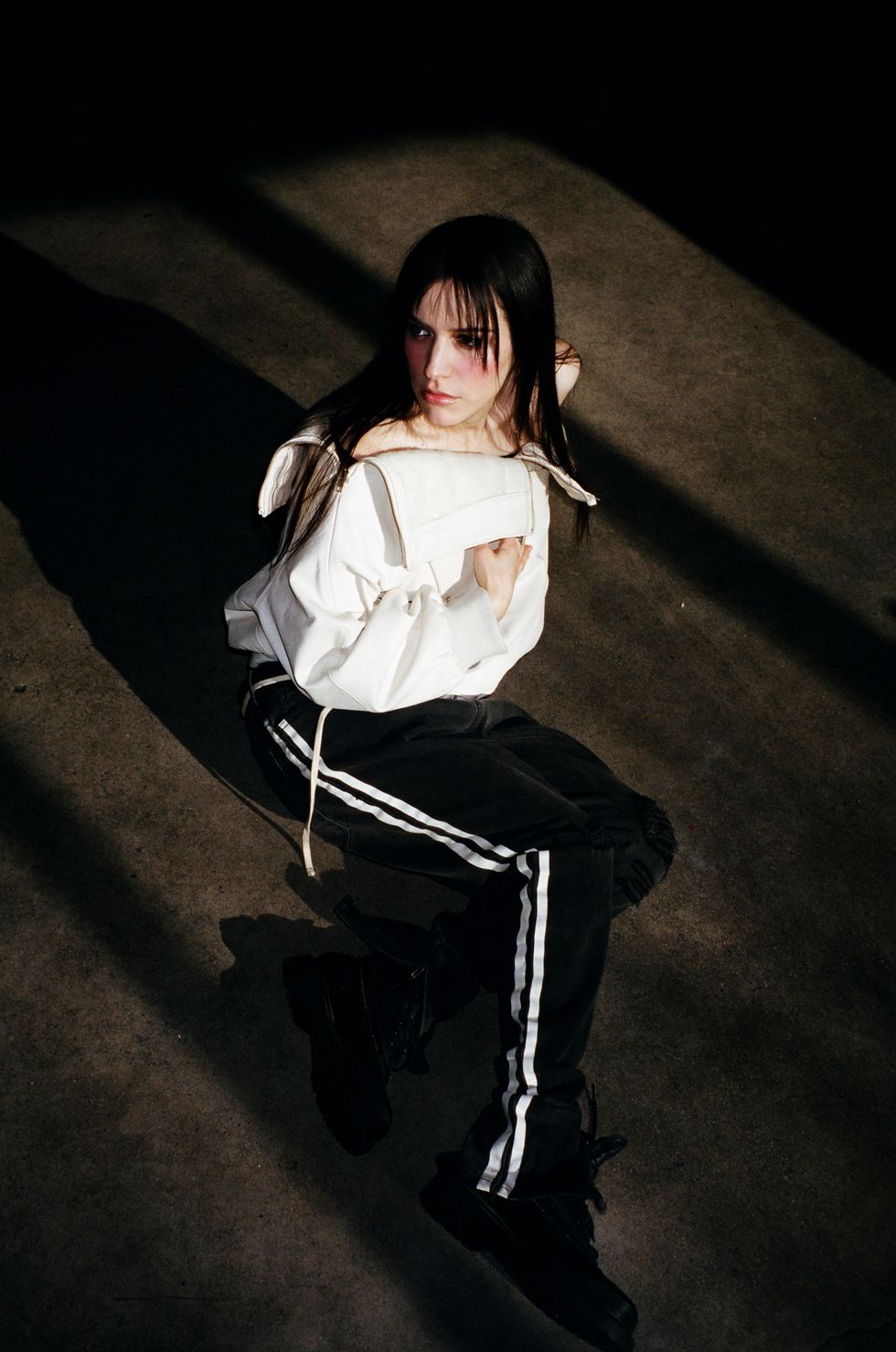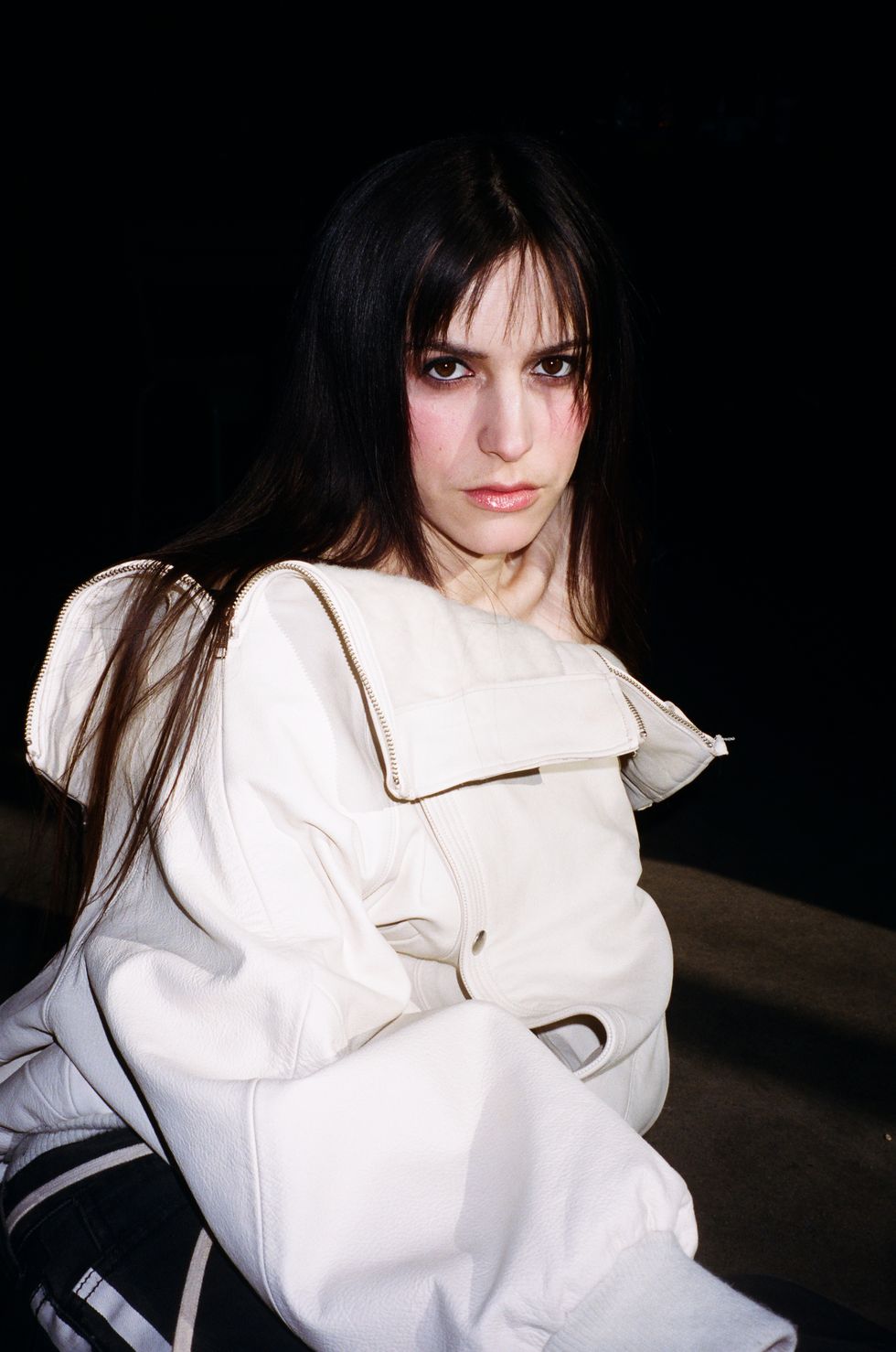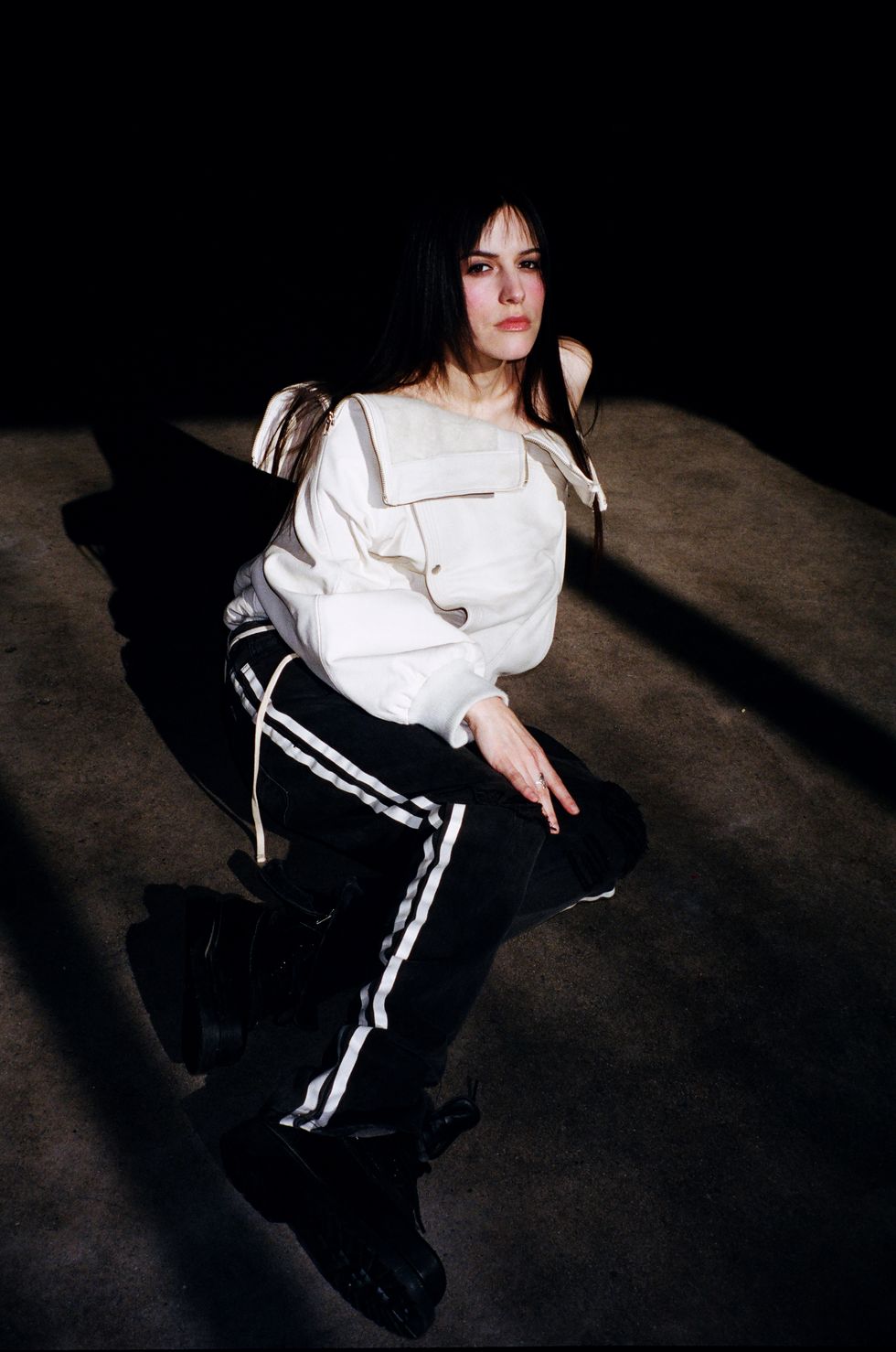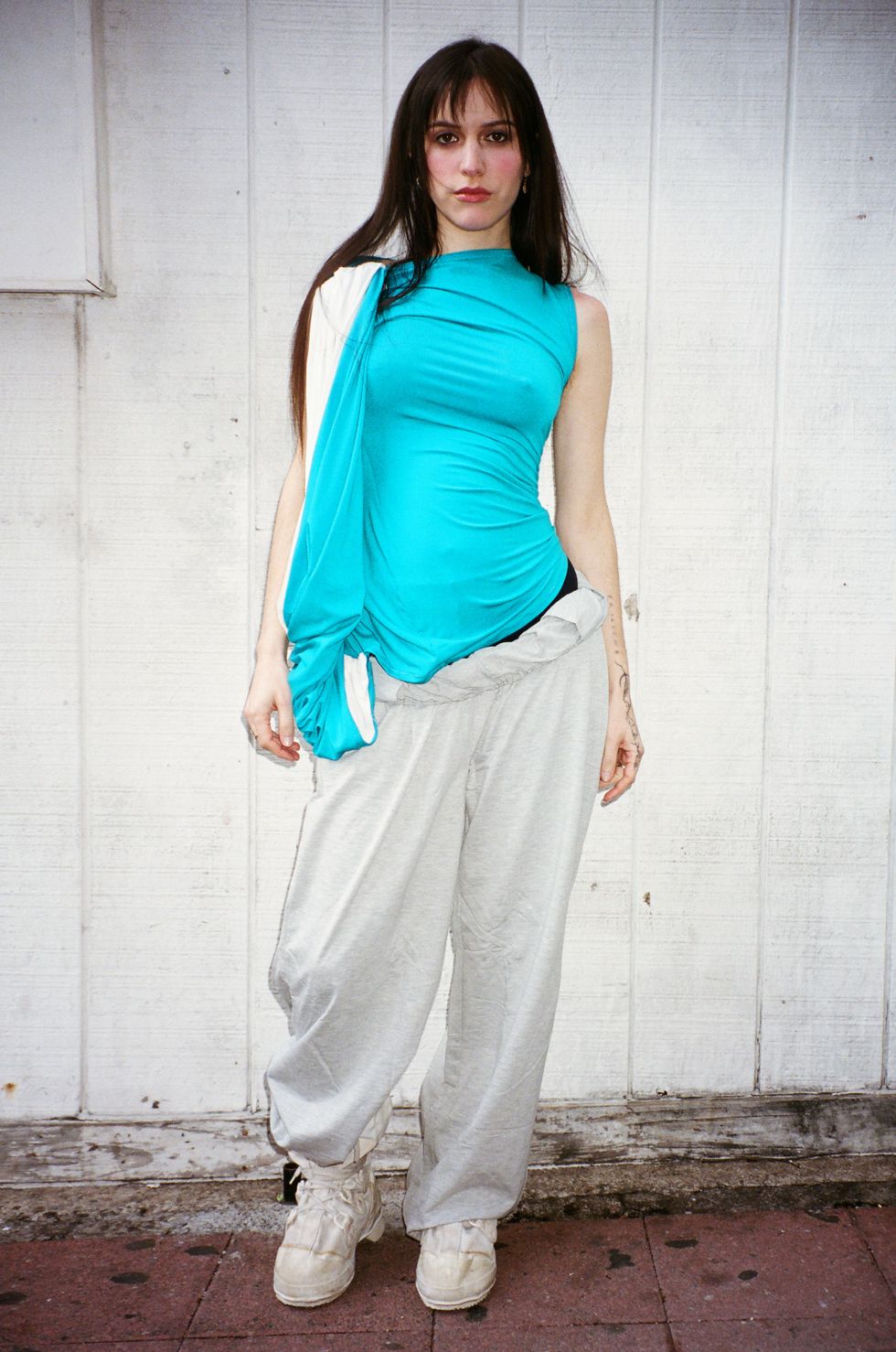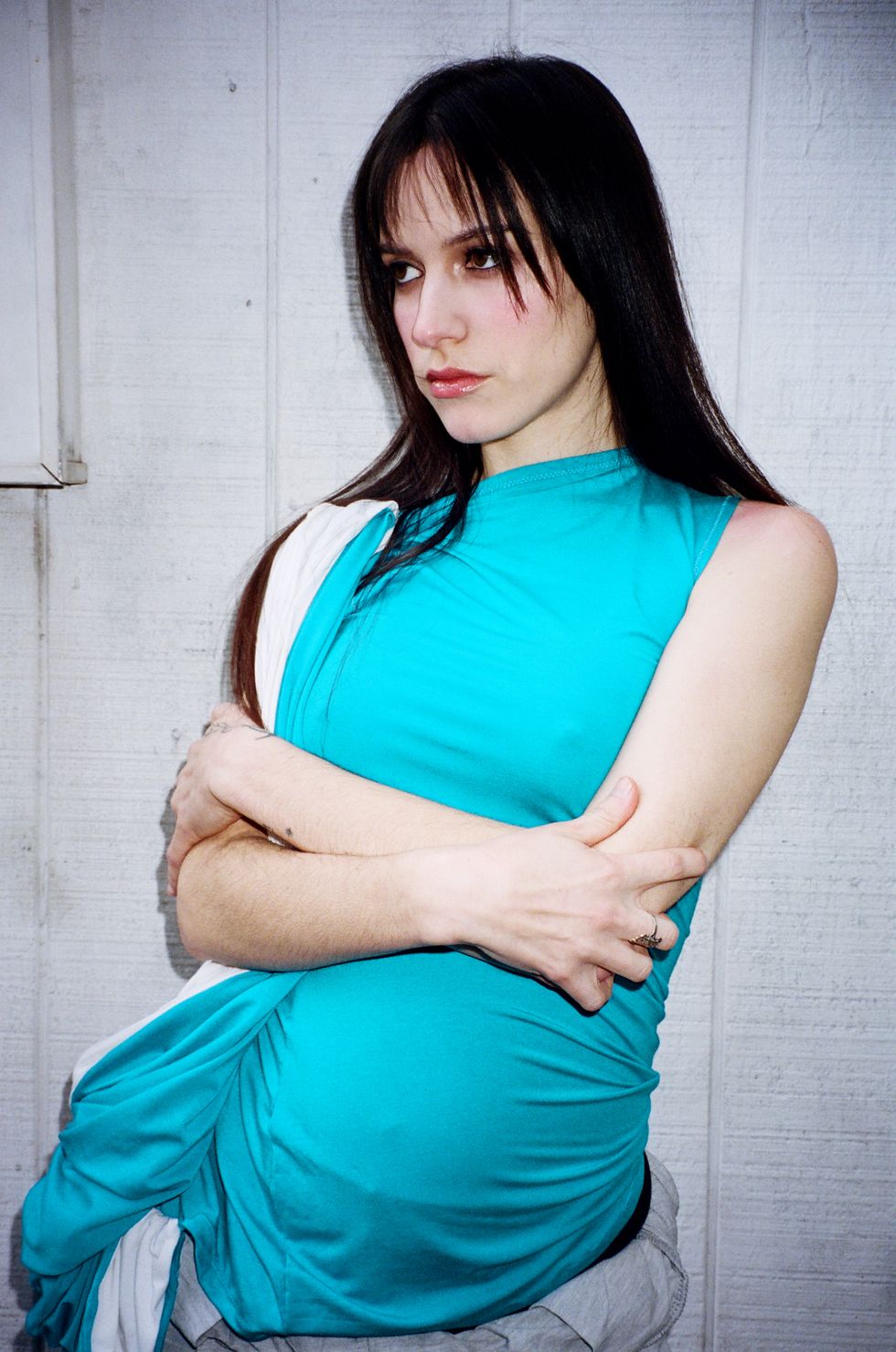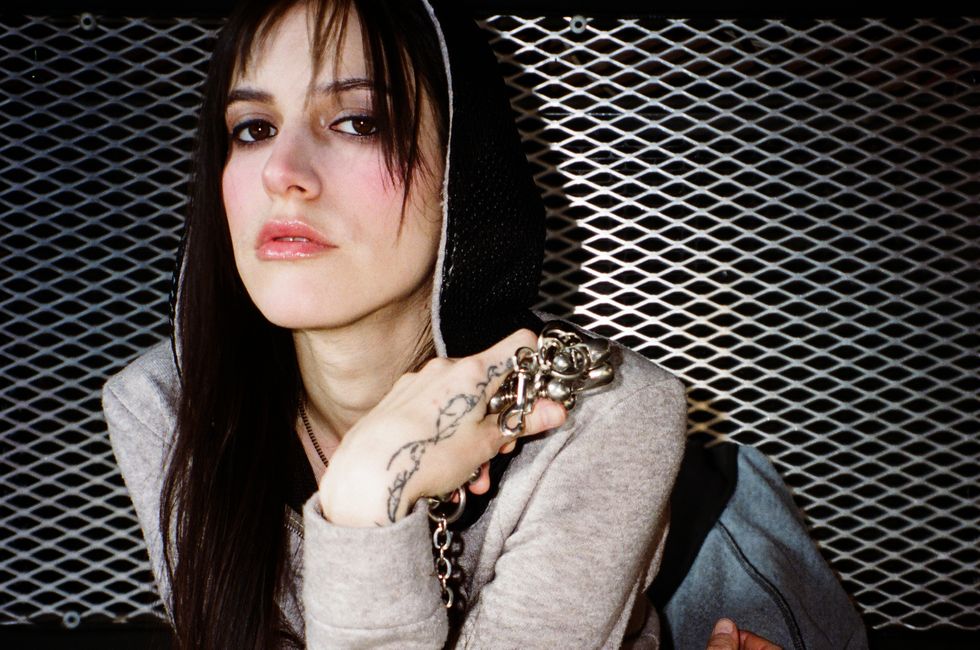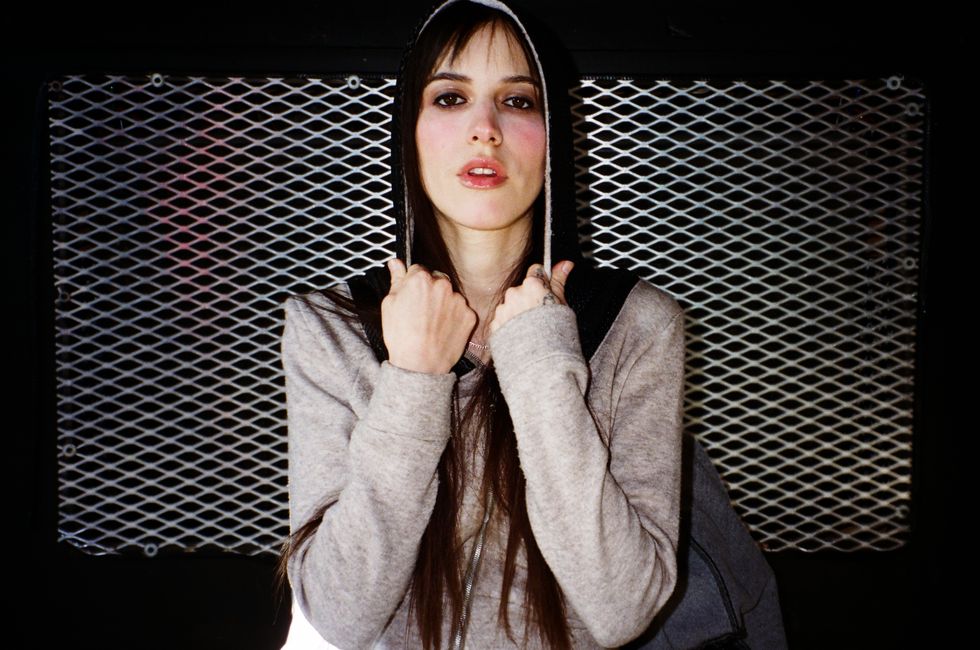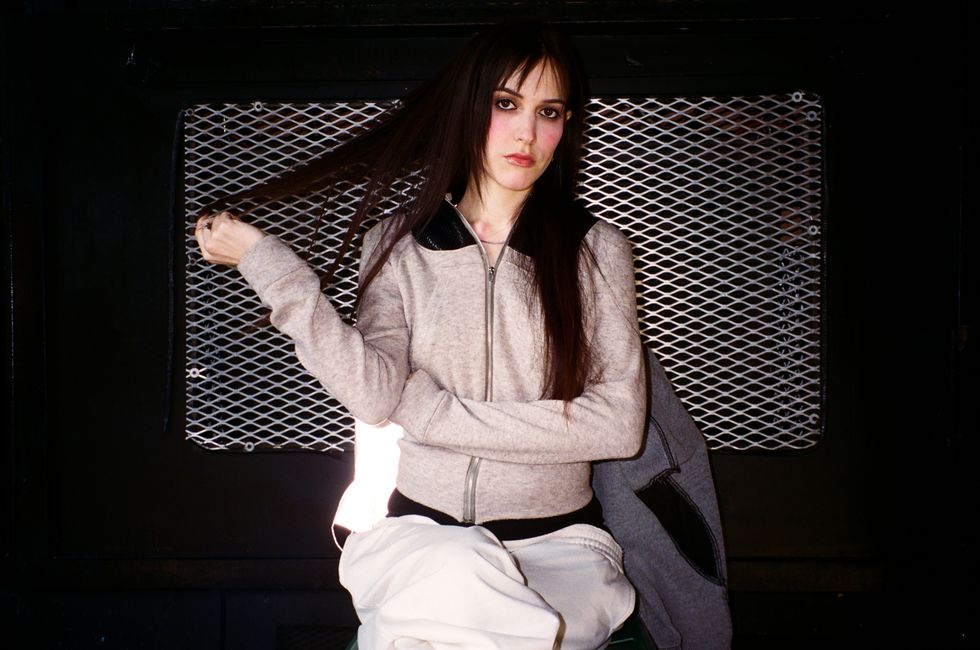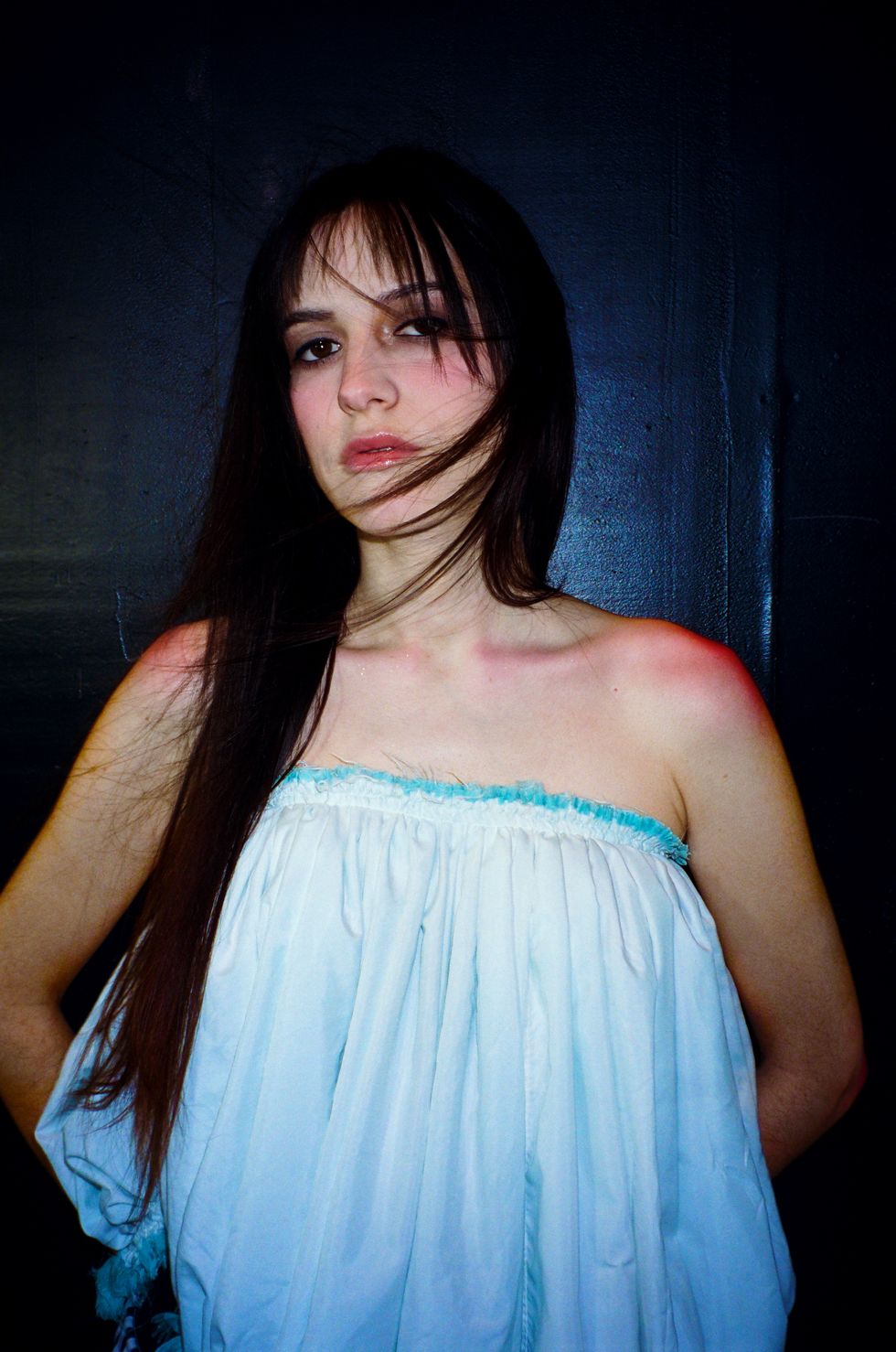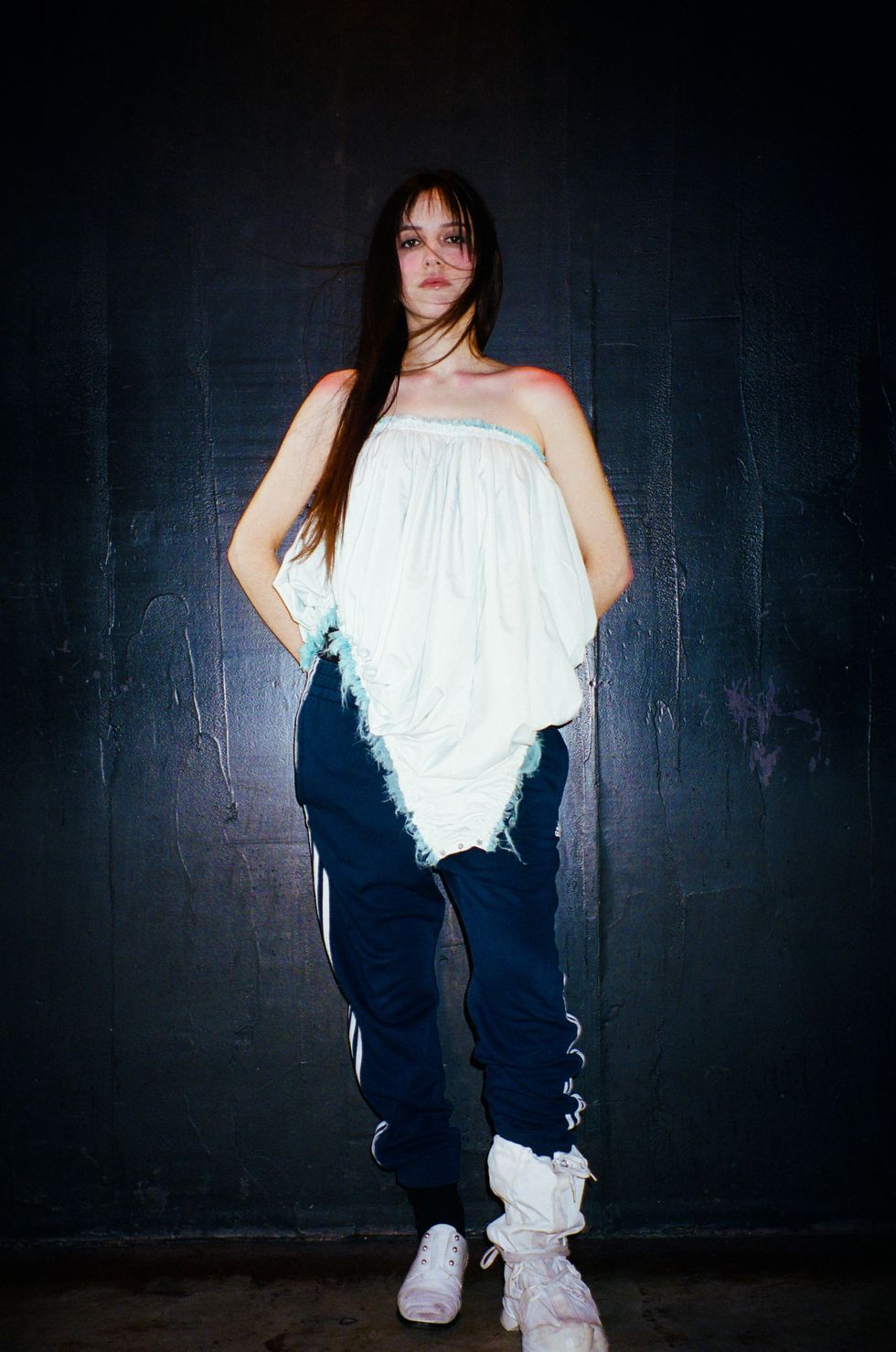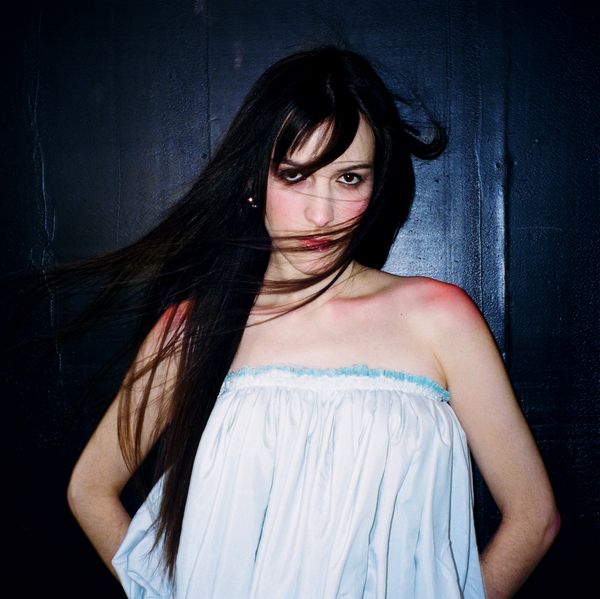
Oklou Comes Back to Earth
Story by Alaska Riley / Photography by Maxwell Vice / Styling by Meg Yates / Makeup by Cassandra Lee / Hair by Aya Yamashita
Feb 07, 2025
For the past few years, fans of French musician Oklou have danced in the dreamworld she created with her 2020 mixtape, Galore. Marked by ethereal production and gentle harmonies, it explored a turning point in her life and romantic relationship — a self-contained soundscape that left listeners with a sense of tenderness and transportability.
Listening to choke enough, Oklou’s debut album (out today via True Panther) is a different experience than her previous release: like a rubber band snapping you into the here and now, with the blinding lights of the present begging you to look at where you are and how it really makes you feel to be here. choke enough digs deeper into the messiness of life, rather than floating above it.
Songs like the hard-hitting single “Harvest Sky” and the album’s title track reverberate with intensity, embodying a shift in emotional register. Those moments of going inward are told around music that thumps with inertia; choke enough pulls you in as it wrestles with itself.
“Galore was so tender, soft and dreamy because I needed that in my life,” Oklou tells PAPER. “I was going through a rough phase and did what was the most soothing for me at the time. Now the music is definitely more intense. It has a different energy to it, and it’s for the same reason.”
With this album, Oklou found herself pulling away from the escapism of her previous projects. “I felt the need to get more connected with elements of real life,” she explains. “I’ve met new people, and even amongst my friends I’ve known for years, I can feel that there’s new energies. My sensibility has been drawn from things in real life.”
This evolution, sonically and personally, is a testament of Oklou’s ability to embrace uncertainty and ambiguity. Unlike Galore, which had a precise emotional intent, choke enough leaves more room for interpretation — a reflection of how Oklou envisions listeners connecting with the album.
“This piece of work feels messy to me; I don’t expect people to receive it in any type of way,” she admits. “My only hope is that they’re gonna feel something.” That openness to change is at the heart of choke enough — a record that doesn’t claim to have answers, but instead lingers in uncertainty.
Ahead of the album’s release, PAPER spoke to Oklou about the conception of choke enough, the collaborative approach with co-creators like Casey MQ and A.G. Cook, music as a vessel to discharge emotions, and walking the tightrope between fantasy and reality.
Congratulations on your debut album. How does it feel to reach this milestone as an artist?
I was actually thinking about that the other day. I don’t even feel like it’s a first. Each time I release something, whether it’s an LP or an EP or whatever, there’s the same amount of fear and excitement.
It’s a big moment. Were there any sonic or emotional developments that surprised you or challenged you this time around?
Yeah, very much, more than any other time in the past. Both lyrically and musically, I had to go places where I wasn’t so comfortable. I had to work a bit more on the language, and I knew that I wanted to explore different emotional zones than I had done for Galore — because I had to. I wanted to go away from the super dramatic and romantic landscape that I was on previously. Not that I don’t like it, I guess I was a bit scared to do the same thing, but less good, you know? I thought it would be less hard to try and explore another part of what I like. So it was challenging in that way, because I think I went somewhere — my research was a bit harder. Technically, a lot of things have changed in the way I did this album. I wasn’t so much on the keyboard and singing over it, which was the genesis of the songs on Galore. I worked in a different way, with a different approach technically.
The storytelling and production on this album are a bit more intense and less ethereal. Was that shift intentional?
So funny, because I’ve done a couple of interviews and I just realized something while you were talking. I think Galore was so tender, soft and dreamy because I needed that in my life. I was going through a rough phase and did what was the most soothing for me at the time. Now the music is definitely more intense. It has a different energy to it, and it’s for the same reason.This album is heavy with reflection and there are a lot of unanswered questions. After its completion, do you feel closer to finding answers or was documenting this journey the main intention?
Casey MQ, my friend and co-producer, we spent hours talking about the songs and their meaning and what we wanted to talk about in the lyrics. I like when things make extra sense for me, so it was a very important process. At the beginning, I wanted to feel like I was touching answers from the tip of my fingers. But pretty early on, I understood it wasn’t about that, it was all about the questions — about the questioning. It’s what makes us human, interested in life with everything we don’t understand.
Speaking of collaborations, such as Casey MQ, A.G. Cook and Bladee — I would love to hear about the roles they played in this album. Were they a part of your vision for this project from its conception?
Casey, for a couple of years, has been somebody that I’ve been working a lot with in a pretty spontaneous and natural way. We don’t just work together, it’s more than that. When you start working on an album, it’s a blank page. You have so many options, so many possibilities. Generally speaking, I know that I want to be the absolute executive voice of the track, even if somebody is working more than me on the music, which didn’t happen. I tried to believe it could feature random people; like, magic can happen with anyone. I tried a few sessions with amazing producers just for the sake of it. It’s a great experience, but for me it doesn’t work. So when I feel the duo we have with Casey needs more insights from the external world, I think about “Who am I gonna ask?” A.G. Cook and Danny [L Harle] are very safe choices for me because I’ve been a fan since forever and I know they know my music as well. I know that they understand it, which is very important. I think I base my collaborations on that feeling of having a real, spiritual understanding of the music of one another.
You’ve described this album as being built on a permanent conversation between a life anchored in reality and another in fantasy. How do you balance those two worlds?
Galore was full-on fantasy aesthetically, which I love. It’s one of my favorite places to go, not just as an artist. I love sci-fi. Yesterday Blade Runner was on the TV randomly and I got so happy. I was like, “Oh, thank god. It’s a sign.” I love these spaces.
But in my recent life, I felt the need to get more connected with elements of real life. I’ve met new people, and even amongst my friends that I’ve known for years, I can feel that there’s new energies. There’s new subjects in the conversations and new interests because we are growing humans that are being concerned by different things. I haven’t experienced that feeling of becoming more adult. It’s weird to say that, but it’s true. My sensibility has been drawn from things in real life, but in my songs I’m not going to talk about what I think is bad about the government. I could, but I don’t have the capacity. So it’s been a struggle, I’m sure there’s a way to link everything: being able to free our imaginations and also be present in life where I think I should be. When I was composing, it was hard for me to sometimes connect all the dots together, and I thought that was a wrong feeling to have. At some point, I realized that’s what the album is about: this struggle to know which direction to go and allow myself to not have just one.
With that being the ethos of this album, how has it informed where you think this era is leading or impacted where you see yourself going next?
I’ve never really thought about that. The tricky thing is, when you do something like this, it’s connected to a moment in your life and then through the campaign, you have to defend the ideas on stage for a while after the album is out. Sometimes it’s hard, because you can change, but that’s okay. I guess I’m just curious how I’m going to be able to express and perform the songs in the most honest way possible. Hopefully I find ways to reinvent the expression with the music when it’s live. I have some clues, but it’s too soon for me to say.
What are you most excited about bringing to live audiences with this album?
Another challenge with this album is that, because the genesis of the tracks was not based on me playing the keyboard, I can’t play the instruments with my hands. So I lost an obvious performing quality with the music, but I’m working on the live show right now. I just started, but it’s gonna be not so much about me playing. I’ve decided to focus the art direction more on the show itself, the lighting especially. I wanted to put an accent on that. It’s something I’ve always wanted to do.
One of the most exciting elemental shifts I noticed about this era was the change in color. Galore was very earthy, dreamy and brown. For choke enough, I really like the blue and green undertones; they feel futuristic and nostalgic at the same time. What were some of your references or influences for the visuals?
When I started working on the visual creation for the album, I had already spent two years talking about the tracks and the lyrics. When building up the mood boards and references, I didn’t try to explain or connect them to the music. In the pictures, I was like, “Is it going to be just me? No, it’s going to be with people. Which actions do I want to happen?” I really wanted each picture to feel like it’s been stolen, or like there’s something or somebody behind the camera. On the cover of the album, we were in an apartment and we’d been filming for two hours. I love this picture because it feels stolen; it’s not in the pose. We didn’t want a perfect angle. I’ve never seen images of my face that felt so real to me. I really wanted to get into more lo-fi inspiration. I think color choices can characterize these different ways of capturing images. The blue and greenish vibes are sci-fi; it’s giving Minority Report and Matrix, obviously. I just loved it for its nostalgic quality.
It’s really cool that you were able to strip back some of the fantasy and show a different version of yourself, but still have those sci-fi elements that feel particular to your artistry.
I really think that’s what I’ve been trying to do.
That introspection and these intentional shifts can take a lot out of somebody, especially as an artist. What did you do during this process to look out for your wellness?
Doing what we do as artists, we see it not like a medicine, not like therapy, but it’s helping. In itself, I don’t see it like something that can be hard, that’s not the way I experience it. It’s a vessel to where I can discharge things. I think it’s very healthy. It’s not something that is tiring to me, I think it’s the other way around. I’m better at expressing the questions within the music than anywhere else. There are difficulties in the creative process that are induced by very specific elements within the work, and that’s these different forces that I need to work with. If there’s something where I need to pay attention to my mental health in the future, it’s with that. Obviously there's personal stuff to deal with, but I am a lucky person on this planet. I’m learning something from this, and that’s good.
What are you hoping fans take away from this album?
Actually, I’m really curious. That’s one thing that’s a big question mark I have upon this release. This piece of work feels messy to me; I don’t expect people to receive it in any type of way. My only hope is that they’re gonna feel something. That’s the most important thing to me: for them to feel some sort of connection with the music, whatever it’s about. That’s something also new for me, because with Galore my intention was very precise. There was just one thing occupying my mind for days and months and years even. But this album is not the same. I let myself not be in charge, almost, so how can I even expect people to feel a certain type of way?
That touches back on what we were talking about earlier, how leaving some of these questions unanswered and shifting the focus onto the journey leaves space for listeners to insert themselves.
I couldn’t hope to deliver a specific message because I’ve been trying to find it, and I haven't yet.
At some point, I realized that’s what the album is about: this struggle to know which direction to go and allow myself to not have just one.
Photography: Maxwell Vice
Styling: Meg Yates
Makeup: Cassandra Lee
Hair: Aya Yamashita
Editor-in-chief: Justin Moran
Managing editor: Matt Wille
Editorial producer: Angelina Cantú
Music editor: Erica Campbell
Story: Alaska Riley
Related Articles Around the Web
MORE ON PAPER
ATF Story
Madison Beer, Her Way
Photography by Davis Bates / Story by Alaska Riley
Photography by Davis Bates / Story by Alaska Riley
16 January
Entertainment
Cynthia Erivo in Full Bloom
Photography by David LaChapelle / Story by Joan Summers / Styling by Jason Bolden / Makeup by Joanna Simkim / Nails by Shea Osei
Photography by David LaChapelle / Story by Joan Summers / Styling by Jason Bolden / Makeup by Joanna Simkim / Nails by Shea Osei
01 December
Entertainment
Rami Malek Is Certifiably Unserious
Story by Joan Summers / Photography by Adam Powell
Story by Joan Summers / Photography by Adam Powell
14 November
Music
Janelle Monáe, HalloQueen
Story by Ivan Guzman / Photography by Pol Kurucz/ Styling by Alexandra Mandelkorn/ Hair by Nikki Nelms/ Makeup by Sasha Glasser/ Nails by Juan Alvear/ Set design by Krystall Schott
Story by Ivan Guzman / Photography by Pol Kurucz/ Styling by Alexandra Mandelkorn/ Hair by Nikki Nelms/ Makeup by Sasha Glasser/ Nails by Juan Alvear/ Set design by Krystall Schott
27 October
Music
You Don’t Move Cardi B
Story by Erica Campbell / Photography by Jora Frantzis / Styling by Kollin Carter/ Hair by Tokyo Stylez/ Makeup by Erika LaPearl/ Nails by Coca Nguyen/ Set design by Allegra Peyton
Story by Erica Campbell / Photography by Jora Frantzis / Styling by Kollin Carter/ Hair by Tokyo Stylez/ Makeup by Erika LaPearl/ Nails by Coca Nguyen/ Set design by Allegra Peyton
14 October
